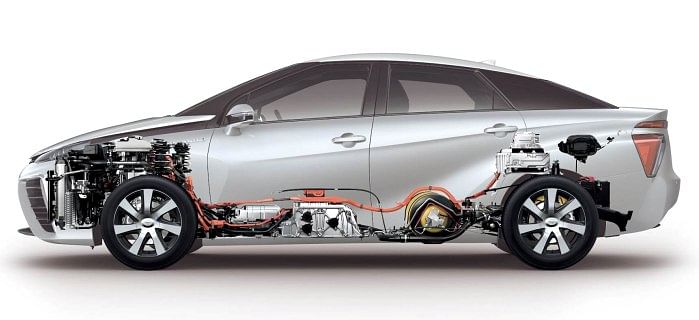Toyota in joint research program for hydrogen energy use in UAE
As part of the program, Toyota will begin driving and refueling demonstration tests of the Mirai fuel cell vehicle in the UAE from May 2017.
Toyota Motor Corporation is to collaborate with Masdar, Abu Dhabi National Oil Company (ADNOC), Air Liquide, and Toyota distributor Al-Futtaim Motors in a joint research program to explore the potential of hydrogen energy use in the United Arab Emirates (UAE) for the creation of a sustainable, low-carbon society.
As part of the program, Toyota will begin driving and refueling demonstration tests of the Mirai fuel cell vehicle (FCV) in the UAE from May 2017.
The agreement was announced yesterday at the Abu Dhabi Sustainability Week (ADSW), which was held at the UAE capital of Abu Dhabi. The program partners will jointly research on key issues involving the establishment of a hydrogen-based society, including hydrogen production, logistics, scalability, and business feasibility. The research is expected to take place in part at Masdar Institute, an Abu Dhabi-based independent graduate research university, which has been part of the discussions on the scope of hydrogen research.

Utilising a hydrogen station that is to be built in May 2017, Toyota says it will conduct a complete range of driving and refueling tests under extreme heat, dust, and other conditions unique to the local environment. The Japanese carmaker will also provide short-term leases to the UAE government institutions and opinion leaders so as to promote better understanding of FCVs and hydrogen-based societies.
"The UAE has vast potential for the expansion of hydrogen production. The country has excess capacity at hydrogen production facilities located at oil refineries, and the ability to produce hydrogen as a byproduct at caustic soda and other factories, not to mention the production potential from mega solar power stations," said Takeshi Uchiyamada, chairman of the Toyota Motor Corporation Board of Directors, who gave a speech at the Abu Dhabi Global Action Day at ADSW.
"As the government continues to promote new initiatives and pursues the creation of a hydrogen-based society, the UAE is able to emerge as the world leader of next-generation clean energies," Mr Uchiyamada added.
UAE Vision 2021
As a major oil-producing nation, the UAE has been dependent on oil as its primary industry. The government is currently promoting a new national agenda called the UAE Vision 2021, which prioritises air quality improvement, expansion of the use of clean energies, and to make the nation a world leader in infrastructure quality. This collaborative research program will explore the potential for hydrogen usage in Masdar City ― a low carbon neighbourhood in Abu Dhabi, which is built on the principles of sustainable design and stands as a commercially-viable "green print" for future urban development across the Middle Eastern region.
Mohamed Jameel Al Ramahi, CEO of Masdar, said: "Toyota is among the most innovative companies in the world, with an outstanding track record of pioneering commercially-viable clean technologies for the automotive industry. Masdar is thrilled to be part of this exciting and important initiative with Toyota, ADNOC, Air Liquide, Masdar Institute and Al-Futtaim Motors, which aims to unlock the enormous potential of hydrogen energy use in the UAE. Hydrogen can make an important contribution towards the UAE's target for a 50% low carbon energy mix by 2050."
Toyota has also announced the Toyota Environmental Challenge 2050 in 2015, to help to contribute to the realisation of sustainable societies. The company is taking various initiatives to accomplish the various outlined challenges, which include reducing CO2 emissions from new cars by 90% (compared with 2010 levels) among others. Toyota is currently selling the hydrogen-fuelled zero emissions Mirai FCV that only emits water in Japan, the United States and Europe.
Held on the official opening day of the Abu Dhabi Sustainability Week, the Abu Dhabi Global Action Day is a conference aimed at turning the goals of the Paris Climate Agreement and the 2030 Agenda for Sustainable Development into practical and innovative solutions in policy, investment, technology and partnerships, with a focus on the steps to be taken by both the government and businesses.
RELATED ARTICLES
Hyundai unveils next−gen highly efficient hybrid system
The next-gen hybrid system is claimed to offer 45% better fuel efficiency and 19% more power compared with ICE powertrai...
Horse Powertrain reveals hybrid conversion for electric cars
Engine-making joint venture of Geely and the Renault Group announces new hybrid powertrain that fits into the same space...
Aisin to produce hybrid motor for Mitsubishi in Thailand
The hybrid drive motor and gearbox, will be produced at Aisin Powertrain (Thailand) Co for use in the Mitsubishi XForce ...






 By Autocar Professional Bureau
By Autocar Professional Bureau
 17 Jan 2017
17 Jan 2017
 6206 Views
6206 Views









